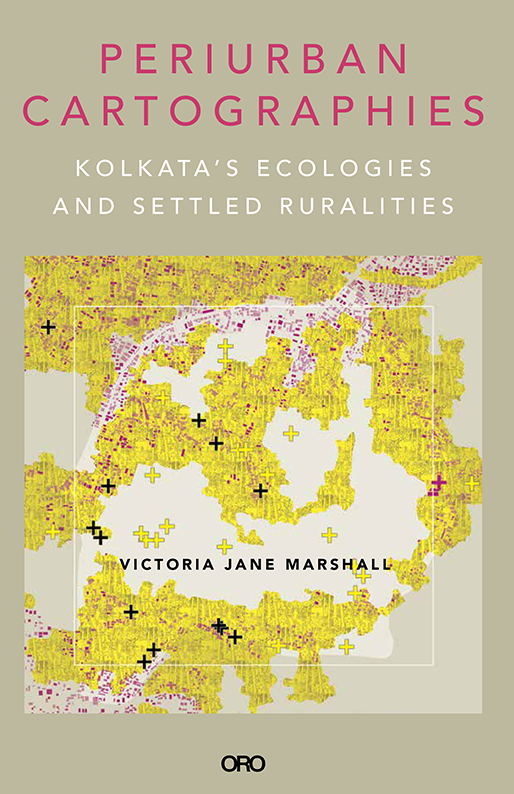Periurban Cartographies: Kolkata’s Ecologies and Settled Ruralities
AUTHORS
Victoria J. Marshall
PUBLISHER
ORO Editions, 2024

‘Periurban Cartographies’ looks through the prism of the “almost urban” to consider what a “city” is or could be. In doing so, the book challenges assumptions and reconsiders design practices.
The research reported upon in this study draws on thick description of everyday life and diffuse power in periurban Gangetic West Bengal/Kolkata. It does so in the hope of enriching our understanding of incremental modes of political empowerment and the futures they make. The intention is to not just communicate the transformations at work in creating a particular “kind of urban”, but also to point to connections that make us rethink the ways in which change happens.
The book is a contribution to work being done on urban theory-building from elsewhere than the Global North, specifically from Asia, and periurban Gangetic West Bengal/Kolkata. It is not simply a look at a novel and singular condition in and of itself but uses that singularity to better understand periurbanism generally and urban political ecologies particularly. Current scholarship in urban political ecology reminds us of some of the enduring tensions around the conceptualizations of region, socio-natures and agency, and practice. The urban political ecology approach in this book offers a way of moving past some of these tensions.
Related media
Book Review:
Acharya, A. (2024). Periurban Cartographies. Places Journal: Public scholarship on architecture, landscape, and urbanism.
[Commissioned reviewer] (forthcoming). Journal of Urban Political Ecology.
Book Launch:
Marshall, V. (2024). Book launch with Lilian Chee and hosted by Jane M. Jacobs. Department of Architecture, National University of Singapore, 4 October.
Related publications:
Marshall, V. (forthcoming) Ordinary Periurban Kolkata: Towards anticipatory practices of commoning? In Vishal Narain and Bharat Dahiya (Eds), Commons and the City. Springer Nature book series, Advances in 21st Century Human Settlements. https://www.springer.com/series/13196
Marshall, V. (2022) Object-led interviews: Documenting geographic ideas. In M. P. Zari, M. Southcombe, & P. Connolly (Eds.), Ecologies Design: Transforming architecture, landscape, and urbanism, Routledge, pp. 130–137.
Marshall, V. (2020). Becoming urban? Towards ordinary, periurbanised territories: a case study of Gangetic West Bengal, India. https://scholarbank.nus.edu.sg/handle/10635/194329
Podcast:
Marshall, V. (2024). Mapping the Periurban. A is for Architecture. A podcast about architecture, buildings, urban culture and space, made and hosted by Ambrose Gillick, UK.
Invited Lecture:
Marshall, V. (2024). Kolkatas Urban Ecologies and Settled Ruralities. CSH-CPR Urban Workshop #177. Centre De Sciences Humaines and Centre for Policy Research, New Delhi, 26 November.
Marshall, V. (2023). Periurban cartographies. Centre for Urban Research. Royal Melbourne Institute of Technology (RMIT), Melbourne, 19-26 February.
Marshall, V. (2021). A particular “kind of urban”: Periurban Kolkata, West Bengal. The rural – urban divide globally: Relationships and dichotomies seminar. Genealogy of Urban Design Network, Consiglio Nazionale delle Ricerche (CNR), Rome, 8 October.
Conference and Symposia:
Marshall, V. (2024). Periurban cartographies: Towards landed representation. Royal Geographic Society-IBG annual international conference 2024. Imperial College, London, 27-30 August.
Marshall, V. (2021). Visualizing an enduring tidal creek: Periurban Kolkata, India. Asia’s wet natures: Past, present, and future. Asia Research Institute and Yale-NUS, Singapore, 28-29 October.
Design Studio Pedagogy:
Marshall, V. (2023). Density Studio: Monsoon Asia
Student Awards:
International Exhibition of Architecture Graduate Design (IEAGD), Taiwan (2024). Ecology Practices for Periurban Ecotourism: Lombok Indonesia, by Tang Wei.
ASLA Honor Award, Urban Design (2024). Remnants to Resonance: Reimagine Coastal Fishing Villages: Choshi, Japan, by Luoman Ouyang, Zhiyi Guo, and Jiaxin Jiang.